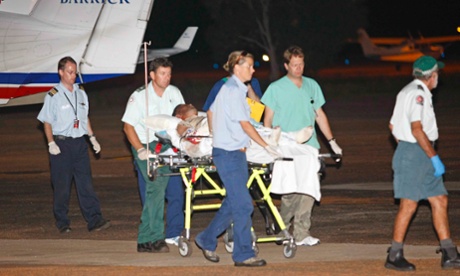The effects of the Australian government’s immigration detention policies on refugees’ health should outrage us all. I applaud those in my profession who have spoken out

I was born the son of an immigrant. My father was a person seeking asylum from communist Hungary, looking for refuge in a new country – the lucky country, Australia.
He too was displaced, forced to move, required to adjust to a new country. Fortunately, he wasn’t put in detention when he arrived. Today, it seems more like jail, where people are locked away while they wait to be “processed”.
I am also a doctor, and the president of the royal Australasian college of physicians. Our profession has a duty of care to all people in Australia. That our government ignores the basic human rights of refugees and asylum seekers distresses me, and it is conflicts with my professional commitment as a physician to serve the health of our people.
So the treatment of refugees and asylum seekers is a personal issue for me. I feel strongly from a healthcare perspective as a doctor, a specialist and as a representative of physicians’ interests. To ignore the appalling conditions people seeking asylum are experiencing would be shirking our obligations as a profession. For us to fail to protest about this treatment would be wrong.
Whatever your view of asylum seekers and refugees, all humans deserve the same level of care – health, education, mental wellbeing and physical health. Doctors save lives, heal the sick and work to prevent disease both physical and mental. If we cannot do this, we are failing in our obligations as doctors, and our government is failing to meet its human rights obligations.
Moreover, no government should impede a doctor’s right to meet their duty of care. Nor should our professional expertise be ignored, or the real issues sidelined. I applaud those in our profession who have spoken out, on poor access to post natal care, dental care, education and having a safe area for children to play.
We need to change our current policy, so it serves the interests of people who have been displaced, and to meet our United Nations obligations. Children are the most vulnerable and they need protection. The damage they are suffering in detention is unacceptable.
When we look back in 30 years on our behaviour, I am sure we will say this policy was a disgrace. The effects of immigration detention on refugees’ health should outrage our nation. The question we should ask is this: how would you want your family to be treated?
